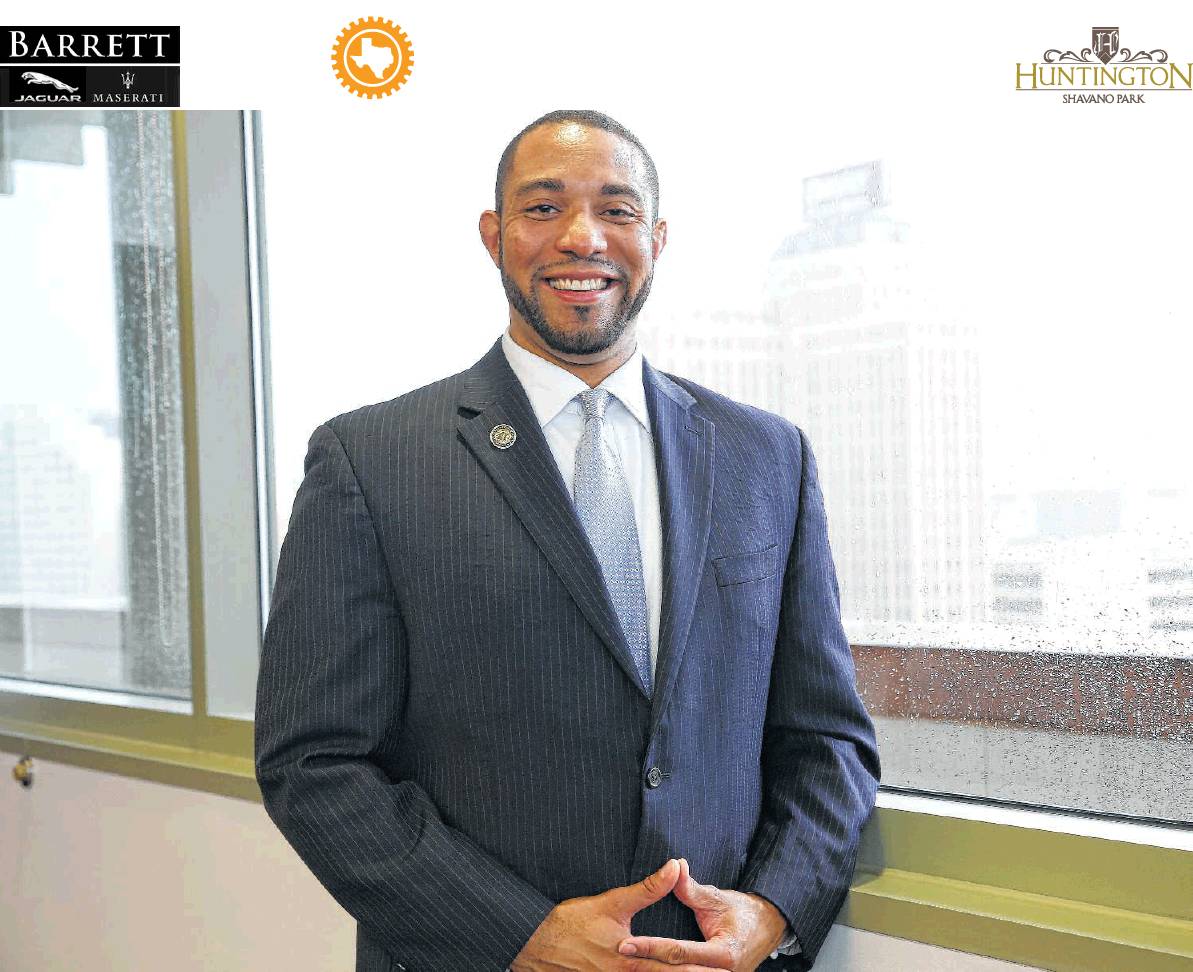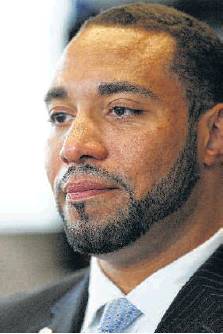TEXAS POWER BROKERS Tommy Calvert, county commissioner
PASSION FOR SERVICE
Desire to help East Side started early for activist
By Richard Webner STAFF WRITER
County Commissioner Tommy Calvert’s political career began during his childhood, when his father brought him to public meetings about crime, drainage and other topics most kids would scoff at.
Instead, Calvert became fascinated. By his teens he was a public speaker with a passion for racial justice and improving the lot of those who live on the East Side. The San Antonio Express-News profiled him at age 14 as a community activist who was “not afraid to jump into the fray.”
Calvert has sought a career in public service ever since. After graduating from Tufts University, he served as the chief of external operations for the American Anti-Slavery Group, traveling to South Sudan and Myanmar to fight human trafficking. He founded his own public relations firm and helped form KRV San Antonio Community Radio, a nonprofit station focused on the local urban community.
He attributes his passion for service to his father, T.C. Calvert, an urban planner, concert promoter and activist who organized for labor groups such as the AFL-CIO. He also drew inspiration from his mother, Val Calvert, who went back to school to get a college degree when he was a boy and earned her Ph.D. at age 66. She now serves as head of the business department at San Antonio College.
When he took office in 2015, Calvert became the first black member of the Commissioners Court. His precinct includes most of downtown, where development is starting to take off, as well as the East Side, which still struggles to attract economic growth.
Calvert, who described himself as “married to my precinct,” says he works long hours to bring jobs and affordable housing to the East Side. He estimates that he is present at more than 3,000 meetings a year of one kind or another.
“I’m playing catch-up for the precinct. There’s been a lot of neglect,” he said. “The other part of it is I am a little bit hyperactive. I’m still an activist, fundamentally, in terms of how I want to work to get things done, but now I am an activist that is in the business of governance.”
Calvert, 37, recently sat down to talk with the Express-News in his office on the top floor of the county’s Paul Elizondo Tower downtown. Here’s an edited transcript of that conversation.
Q: You’ve pushed for the county to increase its role in creating affordable housing. How might it do that?
A: I would take a combination of approaches. I would look at a $100 million bond for affordable housing.
I would look to help stimulate single-family housing in (an affordable) price range by helping to get rid of the impact fee increases at CPS Energy and SAWS. We would look to have rental properties where people would get credit repair, get ready for home ownership in a program, so that they could save the 3.5 to 30 percent that a bank typically requires you to have for a down payment. We would underwrite the construction and land and some other costs of those apartment complexes so they’re affordable.
I would also look at rehab, because the most affordable home is the home that you live in today.
Q: Do you think you would get support from the other commissioners for your housing bond?
A: Yeah, because I think that as we have 1.5 million people moving into the county, they’re going to be moving into every segment of the county. The voices in the neighborhoods are becoming stronger and louder, and politically there will be nowhere for the elected officials to hide anymore.
Q: Property taxes are surging in East Side neighborhoods. What’s the solution?
A: We ought to index the net property tax bill to inflation. I believe that allows better planning by families. I agree with what (Texas House) Speaker (Joe) Straus has said, that if we took a billion dollars from the rainy day fund and funded our schools, we could give people meaningful appraisal and tax relief.
Q: Many local residents are skeptical of new development because they’re worried it will price them out, while others say building more is the way to lower housing costs. What do you think?
A: This issue of affordable housing is happening in very, very profound ways all over the United States, because people are migrating to the cities. The fact that they can’t afford home ownership is going to be a major problem.
I don’t agree with no development, because these communities have suffered through disinvestment. People didn’t send me to become commissioner just to see things stagnate. They did send me to progress the community. The question is, who is this progress for? If the progress is not for everybody, it’s going to end up having a lot of turmoil. The turmoil and civil unrest will have political consequences for some elected officials that put their head in the sand. I think that I’m showing my hardest that I’m leading on solutions on this, but we don’t have the votes yet that we need.
Q: You’ve said that the local decision to abandon the bidding process for Amazon’s new headquarters was a mistake. Why?
A: The Amazon bid should have been our moonshot for getting STEM and IT-related jobs. What I would have done in the bid is say, “OK, Amazon, we recognize that we do not have necessarily all of the labor force we need, but we can build it. What we’re going to do is in every high school we’ll have teachers who can teach the basic IT courses.”
Q: East Side residents say they’re frustrated by the lack of retail options. How can we fix that?
A: Retail follows rooftops, meaning you have to have the disposable income for a company to look at your census tracts and say, “I have a market.” That’s part of the reason I focus so much on housing, housing, housing first for economic development, because you have to bring the middle-class back to the East Side so that you have a diversified market. It doesn’t mean you force the poor and the working-class out. It just means that you have poor next to middle-class and hopefully even next to upper-class.
Q: Tell me about your plans to build up the area around the AT&T Center.
A: It’s very important to keep the Spurs in San Antonio and not in a place like San Marcos, where they could get corporate dollars from Austin and San Antonio. The vested interest of the county not having the AT&T Center and Coliseum grounds empty in the future is to develop the area just like Jerry Buss did in Los Angeles with L.A. Live. That’s a similar model that I would offer.
I think the county needs to start realizing the asset it has, the 170 acres of land (around the AT&T Center). Why can’t the county get some return on its investment, so we could have hotels? We could have restaurants that give a percentage to the county coffers that we can use for public safety, economic development, repair of streets, any kind of mental health.
I can envision an amusement park. I can envision an amphitheater, more park space, a lot of parking garages with housing on top, restaurants on the rooftop, retail on the floor, mixed-use office space. I can envision sky rooms for banquets that people could rent.
Q: What are your future career plans?
A: They can get me off this court faster if they pass a housing bond. If we can do an affordable housing bond, if we can do the development of the Freeman Coliseum and AT&T Center grounds in a way that keeps the Spurs there.
Q: Do you think you’ll ever aspire for a state or federal office?
A: The way some of these state leaders and federal leaders are messing things up, yeah, more than ever. But I have really never wanted to be in those circumstances, to be perfectly honest with you. I don’t hear a lot of folks really offering solutions. The rhetoric is the same. I don’t think most politicians understand economics. If I can be helpful, yeah. I feel like I can do a hell of a lot better of a job than a lot of folks there now.
“I’m still an activist, fundamentally, in terms of how I want to work to get things done, but now I am an activist that is in the business of governance.”



